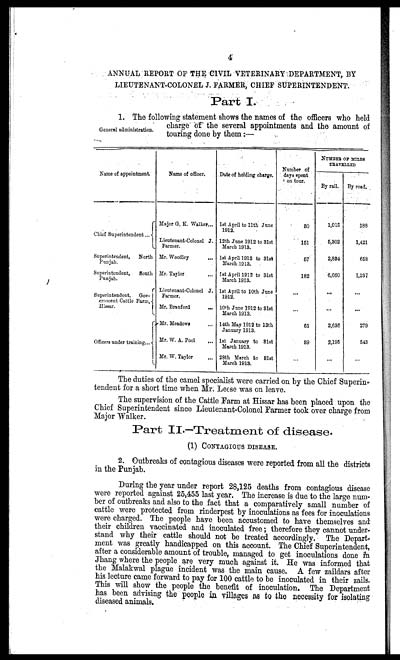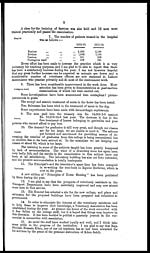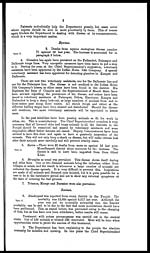Medicine - Veterinary > Civil Veterinary Departments > 1894-1932 - Annual report of the Punjab Veterinary College and of the Civil Veterinary Department, Punjab > 1909-1919 > 1912-1913 - Annual report of the Punjab Veterinary College, Civil Veterinary Department, Punjab, and the Government cattle farm Hissar for the year 1912-13
(172) Page 4
Download files
Individual page:
Thumbnail gallery: Grid view | List view

4
ANNUAL REPORT OF THE CIVIL VETERINARY DEPARTMENT, BY
LIEUTENANT-COLONEL J. FARMER, CHIEF SUPERINTENDENT.
Part I.
General administration.
1. The following statement shows the names of the officers who held
charge of the several appointments and the amount of
touring done by them:—
|
Name of appointment. |
Name of officer. |
Date of holding charge. |
Number of |
NUMBER OF MILES |
|
|
By rail. |
By road. |
||||
|
Chief Superintendent ... |
Major G. K. Walker... |
1st April to 11th June |
30 |
1,015 |
188 |
|
Lieutenant-Colonel J. |
12th June 1912 to 31st |
151 |
6,302 |
1,421 |
|
|
Superintendent, North |
Mr. Woodley ... |
1st April 1913 to 31st |
57 |
2,884 |
658 |
|
Superintendent, South |
Mr. Taylor ... |
1st April 1912 to 31st |
182 |
6,660 |
1,237 |
|
Superintendent, Gov- |
Lieutenant-Colonel J. |
1st April to 10th June |
... |
... |
... |
|
Mr. Branford ... |
10th June 1912 to 31st |
... |
... |
... |
|
|
Officers under training... |
Mr. Meadows ... |
14th May 1912 to 13th |
61 |
2,636 |
279 |
|
Mr. W. A. Pool ... |
1st January to 31st |
39 |
2,195 |
543 |
|
|
Mr. W. Taylor ... |
28th March to 31st |
... |
... |
... |
|
The duties of the camel specialist were carried on by the Chief Superin-
tendent for a short time when Mr. Leese was on leave.
The supervision of the Cattle Farm at Hissar has been placed upon the
Chief Superintendent since Lieutenant-Colonel Farmer took over charge from
Major Walker.
Part II.—Treatment of disease.
(1) CONTAGIOUS DISEASE.
2. Outbreaks of contagious diseases were reported from all the districts
in the Punjab.
During the year under report 28,125 deaths from contagious disease
were reported against 25,455 last year. The increase is due to the large num-
ber of outbreaks and also to the fact that a comparatively small number of
cattle were protected from rinderpest by inoculations as fees for inoculations
were charged. The people have been accustomed to have themselves and
their children vaccinated and inoculated free; therefore they cannot under-
stand why their cattle should not be treated accordingly. The Depart-
ment was greatly handicapped on this account. The Chief Superintendent,
after a considerable amount of trouble, managed to get inoculations done in
Jhang where the people are very much against it. He was informed that
the Malakwal plague incident was the main cause. A few zaildars after
his lecture came forward to pay for 100 cattle to be inoculated in their zails.
This will show the people the benefit of inoculation. The Department
has been advising the people in villages as to the necessity for isolating
diseased animals.
Set display mode to: Large image | Zoom image | Transcription
Images and transcriptions on this page, including medium image downloads, may be used under the Creative Commons Attribution 4.0 International Licence unless otherwise stated. ![]()
| Permanent URL | https://digital.nls.uk/75531606 |
|---|
| Additional NLS resources: |
|---|




